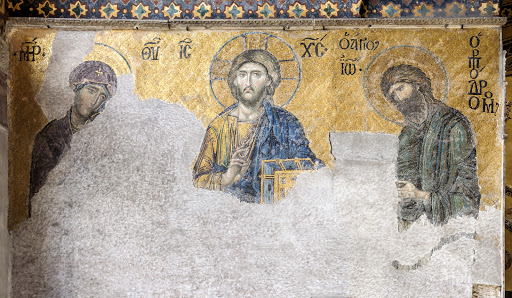
“God put this power to work in Christ when he raised him from the dead and seated him at his right hand in the heavenly places, far above all rule and authority and power and dominion, and above every name that is named, not only in this age but also in the age to come. And he has put all things under his feet and has made him the head over all things for the church, which is his body, the fullness of him who fills all in all.” — Ephesians 1:20-23
Many congregations observe this coming Sunday as Ascension Sunday, recalling those stories in scripture in which Jesus, having spent time with his closest friends and followers after his resurrection, disappears from their earthly view. In the letter to the Ephesians, this Ascension is interpreted as God’s elevation of Christ above the powers – the language which biblical authors use to grapple with the reality of unhealthy systems, and with the way that God’s grace made manifest in Jesus Christ challenges, upends, and ultimately heals these systems. Christ, who according to Ephesians has in some mysterious sense already transformed the harmful systems of this world, communicates grace to a world in need of it. To speak of grace is also to witness to these systems with the faith that they are already subject to transformation. For the author of Ephesians, the gospel of grace – “By grace, you have been saved!” – emerges from this context of Christ’s triumph over the powers and systems of this world.
What does this have to do with mental health? When I was first diagnosed with bipolar disorder in 2011, I quickly realized how much of my life would be taken up, not only by learning to manage my symptoms, but by trying to navigate the ins and outs of the U.S. mental healthcare system and the spiderweb of systems surrounding it, from health insurance to medical debt collections to inequitable legislation and more. As I began sharing my story and facilitating spaces within faith communities for honest discussion of mental health challenges, I quickly learned how important it was to also address those systems that prevent so many people from accessing care – and thus, prevent so many people from speaking up about their challenges to begin with. The vulnerability needed for authentic storytelling is hard to muster up when the powers seem to be on the prowl, waiting to strike.
Mental health advocacy might begin with our own stories, but ultimately it means the joining of those stories into a larger conversation, one with the courage (and, at times, the volume!) to challenge unjust systems and inequitable institutions.
As followers of the same Christ who is raised above the powers, we are called exactly to Christ’s work of challenging those powers, and thus, offering true healing. To paraphrase the language of Ephesians 2, we are saved by pre-existing grace, from unhealthy systems, for the work of the common good. Perhaps this Ascension Sunday is an opportunity for our congregations to proclaim this good news: Christ is raised above the powers; and frees us for the work of calling those powers to account.
“For by grace you have been saved through faith, and this is not your own doing; it is the gift of God— not the result of works, so that no one may boast. For we are what he has made us, created in Christ Jesus for good works, which God prepared beforehand to be our way of life.” – Ephesians 2:8-10

David Finnegan-Hosey
David Finnegan-Hosey is the author of Christ on the Psych Ward and Grace is a Pre-Existing Condition: Faith, Systems, and Mental Healthcare. He serves as College Chaplain and Director of Campus Ministries at Barton College. He holds an M.Div from Wesley Theological Seminary and a unit of Clinical Pastoral Education from the National Institutes of Health Clinical Center. He is certified by Mental Health First Aid USA to provide initial help to people experiencing depression, anxiety, psychosis, and substance use disorders. In 2011, David was diagnosed with bipolar disorder after a series of psychiatric hospitalizations. He now speaks and writes about the intersections among mental illness, mental health, and faith. David lives in Wilson, NC with his wife Leigh, their daughter Laila, and their dog Penny Lane.